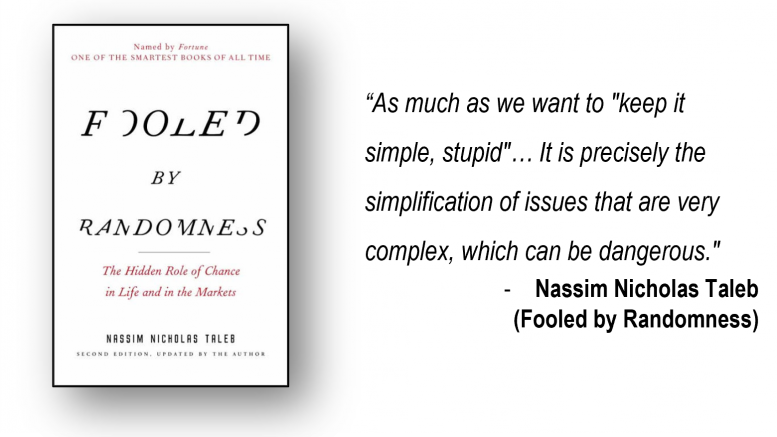The book is written by Nassim Nicholas Taleb, a genius mathematician, trader, and acclaimed essayist. So, when I laid my hand on this book, I was particularly yearning to know more about the intersection of probability, bias, and luck. I was in for a great (literary and intellectual) ride.
The book made me notice how I perceived luck in personal and professional experiences. Presented across fourteen chapters, the book can be a little wry in parts, but Nicholas has a distinct voice that will not let you quit in the middle.
The take and tone are for a reason to deliver a message in three parts: we are not good at dealing with uncertainty; instead of considering all the possibilities, we tend only to see what happened, and hence our perspective about uncertainty is limited; and the way to get past this is to consider the process and be assured that it would have handled bad news well.
A few interesting takeaways from the book for me:
- Emotions can overwhelm any capacity for rational thought.
- Remember that nobody accepts randomness in his own success, only his failure.
- The past blowups were always surprises, as all future ones will also be.
- Just because it hasn’t happened before doesn’t mean it won’t happen any time.
- Wealth does not make people happy, but positive increases in wealth may.
- We are genetically poor at understanding the impact of rare events. One black swan makes the long-held belief that all swans are white incorrect.
- People get attached to their ideas, but we should learn to change our minds when presented with solid evidence.
- The only aspect of your life that fortune does not have control over is your behavior
- Human brain was not built to make forecasts or think in probabilities.
- Reduce exposure to noise – newspapers, daily stock price changes, television, etc.
- People often mistake luck and randomness for skill and logic.
- In the long run, successful fools will run out of luck, and after many years of success, they will have one disastrous quarter where they lose everything
- Path-dependent outcome – things sometimes end up as they are because of luck or randomness, not because it makes sense.
Nassim has also introduced some brilliant sources of other authors that I might refer to for future reading:
- Montaigne’s writing and critical approach to introspective thought.
- Robert Schiller’s 1991 paper on the probability and information (first mathematical proof of the low value of information).
- Gary Stix science writing
- The Selfish Gene by Richard Dawkins
- Karl Popper’s work
- Read about the Jacovian Dilemma
- Mean Genes book
- Randomness by Deborah Bennett
- C.P. Cavafy’s poetry
What I liked about the book: The book is peppered with anecdotes; the writing is not plain statistical; it is poetic and lively. The takeaways are for life; they are sharp, provocative, and relevant beyond the world of trading. I learned some interesting concepts: hindsight bias, selection bias, narrative fallacy, alternative histories, and others. Nassim has used great analogies to dumb down some ideas.
What I didn’t enjoy: The focus moves away too quickly for someone who gets bored very easily. It continuously digresses without making a fundamental point.
Overall take: An excellent one-time read to shatter some illusions and build some reasoning on how we view the world and its chances.
The views and opinions published here belong to the author and do not necessarily reflect the views and opinions of the publisher.



Be the first to comment on "Fooled by randomness"